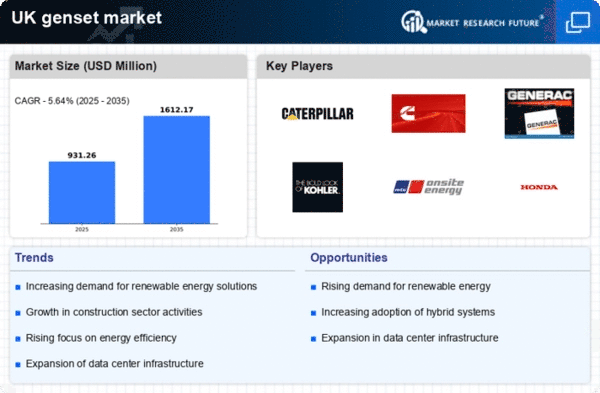Growth of Renewable Energy Integration
The integration of renewable energy sources into the power grid is significantly influencing the genset market in the UK. As the country aims to achieve its net-zero emissions target by 2050, there is a growing emphasis on hybrid power systems that combine traditional gensets with renewable energy sources such as solar and wind. This trend not only enhances energy security but also reduces reliance on fossil fuels. The genset market is likely to benefit from this shift, as hybrid systems require advanced gensets capable of seamless integration with renewable technologies. Analysts predict that the hybrid genset segment could account for over 30% of the total market share by 2027, reflecting a substantial opportunity for growth in this area.
Rising Infrastructure Development Projects
Infrastructure development projects across the UK are driving the demand for gensets in various applications. The government has initiated several large-scale projects, including transportation, housing, and energy infrastructure, which require reliable power solutions. Gensets are essential for construction sites, providing temporary power for tools and equipment. The UK construction sector is projected to grow by 4% annually, further propelling the genset market. Additionally, the increasing focus on smart city initiatives necessitates the deployment of backup power systems to ensure the resilience of urban infrastructure. As a result, the genset market is expected to see a robust increase in demand, with a projected market value of £1 billion by 2025.
Increasing Demand for Reliable Power Supply
The genset market in the UK is experiencing a notable surge in demand for reliable power supply solutions. This trend is primarily driven by the growing need for uninterrupted power in various sectors, including healthcare, manufacturing, and data centers. As businesses increasingly rely on continuous power for operations, the genset market is projected to grow at a compound annual growth rate (CAGR) of approximately 5.5% over the next five years. This demand is further fueled by the rise in extreme weather events, which can disrupt power supply, thereby necessitating backup power solutions. Consequently, the genset market is likely to see an influx of investments aimed at enhancing the reliability and efficiency of power generation systems.
Technological Advancements in Genset Design
Technological advancements are playing a pivotal role in shaping the genset market in the UK. Innovations in engine design, fuel efficiency, and emissions control are enhancing the performance of generators. For instance, the introduction of advanced control systems and IoT integration allows for real-time monitoring and management of gensets, improving operational efficiency. The market is witnessing a shift towards more compact and lightweight designs, which are easier to transport and install. Furthermore, the UK government has set stringent emissions regulations, prompting manufacturers to develop cleaner and more efficient gensets. This focus on innovation is expected to drive growth in the genset market, with an anticipated increase in market value reaching £1.2 billion by 2026.
Focus on Emergency Preparedness and Disaster Recovery
The emphasis on emergency preparedness and disaster recovery is becoming increasingly relevant in the UK, thereby impacting the genset market. With the rise in natural disasters and unforeseen events, businesses and public institutions are prioritizing the establishment of contingency plans that include reliable backup power solutions. Gensets are integral to these plans, providing essential power during outages. The UK government has also recognized the importance of resilience in critical infrastructure, leading to increased funding for emergency power systems. This focus on preparedness is likely to drive growth in the genset market, with estimates suggesting a potential increase in market size by 20% over the next three years as organizations invest in robust power solutions.
















